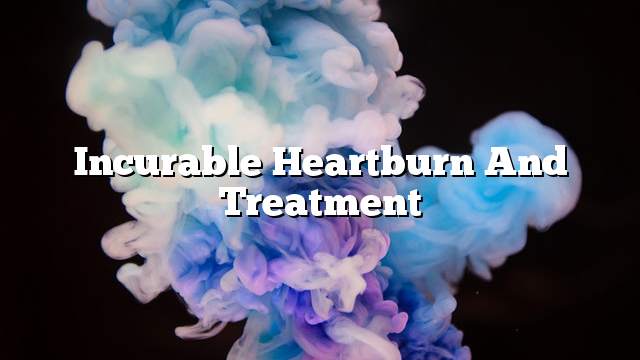Describe the problem
If you have symptoms of chronic acidity or heartburn, you are one of the millions of people suffering from gastroesophageal reflux disease, or gastric acid reflux into the esophagus.
Some people develop heartburn or a burning sensation in the chest, and some may have difficulty swallowing; sometimes the disease may cause persistent cough, bronchial asthma or sore throat.
It also often increases its symptoms during sleep, which can cause extreme tenderness and change in the lifestyle of the infected person. People are forced to make drastic changes in their lifestyles, such as avoiding spices, fatty foods and oils, and must use life-long expensive medicines.
There is between the esophagus and stomach “muscle lower esophagus”, which prevents when the contraction of acid reflux and stomach acid towards the esophagus. At the same time, this muscle relaxes when swallowing food and drink to allow it to pass into the stomach.
The disease of heartburn causes the muscle to relax at the bottom of the esophagus inappropriately and at inappropriate times lead to the return of the juice to the esophagus leading to a sense of burning and pain
The symptoms of heartburn may become so painful that they spoil the annual life and can lead to long-term consequences such as:
- Permanent changes in the style of food, drink and sleep, which impinges on the injured person’s life leading to symptoms similar to symptoms of asthma and persistent cough.
- Disorders of normal sleep, and in some cases sleep in the sitting position to reduce the burning stomach.
# Continued gastric acid reflux into the esophagus for long years of untreated may lead to many complications, the most serious of which is called “Barrett Esophagus” which is a condition that may rarely turn to cancer of the esophagus.
Gastroesophageal patients have two basic treatment options:
Chronic medications or surgery
- The use of drugs that inhibit the secretion of acid in the stomach has excellent results in terms of reduction or disappearance of symptoms, but the problem that the symptoms return when the use of medicine, requiring frequent use of the drug: may be daily, or day after day, life, causing a financial burden Of the patient, and may expose him to rare complications of the drug.
- Surgery, however, helps to correct the dysfunction of the lower esophageal muscle. Its success rate is about 80-90%, but any surgery is prone to complications, imbalances, high costs, and absence from work during recovery. In addition, recent studies have shown that the effect of surgery on correcting the work of the lower muscle of the esophagus gradually disappears over time. The clinical follow-up of patients showed that 60% of them had reintroduced drugs after 5 years of surgical procedure.
Weight gain (obesity) increases the symptoms of heartburn, so weight loss helps greatly reduce symptoms and reduce the use of medication.
It is known that smoking exacerbates the problem by helping to relax the esophageal valve, so quitting smoking is a key to controlling the problem.
STRETTA PROCEDURE is a new method of gastric bypass surgery that uses a special device to connect the Radiofrequency energy waves to the flaccid esophageal muscle. These waves tighten collagen in the muscle, preventing the gastric reflux into the esophagus.
This new technique is approved by the FDA and is currently available in Jordan, where Dr. Fadi Diab attended the necessary training courses and is now practicing at his medical center.
The procedure works in the endoscopy section without the need for hospitalization, and the duration of the procedure is about 60 minutes. The patient can then take fluids for 24 hours and then return to eat.
Studies have shown that this technique is effective, and then can be dispensed with acidity drugs up to 80% of cases.
Dr.. Fadi Diab
